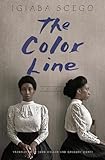The Color Line
Material type: TextPublisher: New York, NY : Other Press, [2022]Description: 521 pages : illustrations ; 21 cmContent type:
TextPublisher: New York, NY : Other Press, [2022]Description: 521 pages : illustrations ; 21 cmContent type: - text
- unmediated
- volume
- 9781635420869
- PQ4919.C373L5613
| Item type | Current library | Collection | Shelving location | Call number | Status | Date due | Barcode | Item holds | |
|---|---|---|---|---|---|---|---|---|---|
| Books | Asian University for Women Library | Fiction | Fiction | PQ4919.C373L5613 (Browse shelf(Opens below)) | Available | 031608 |
Browsing Asian University for Women Library shelves, Shelving location: Fiction, Collection: Fiction Close shelf browser (Hides shelf browser)

|

|

|

|

|

|

|
||
| PQ2702.E725 The Postcard | PQ2726.E55A7713 The Art of Losing / | PQ3979.3.R49J3713 The Gardens of Consolation | PQ4919.C373L5613 The Color Line | PQ7798.21 Berlin Atomized: A Novel | PQ8097.N4A2 The Poetry of Pablo Neruda | PQ8180.17.A73C513 One Hundred Years of Solitude |
Originally published in Italian as La linea del colore in 2020 by Bompiani, Milan.
"Inspired by true events, this gorgeous, haunting novel intertwines the lives of two Black female artists more than a century apart, both outsiders in Italy. It was the middle of the nineteenth century when Lafanu Brown audaciously decided to become an artist. In the wake of the American Civil War, life was especially tough for Black women, but she didn't let that stop her. The daughter of a Chippewa woman and an African-Haitian man, Lafanu had the rare opportunity to study, travel, and follow her dreams, thanks to her indomitable spirit, but not without facing intolerance and violence. Now, in 1887, living in Rome as one of the city's most established painters, she is ready to tell her fiancé about her difficult life, which began in a poor family forty years earlier. In 2019, an Italian art curator of Somali origin is desperately trying to bring to Europe her younger cousin, who is only sixteen and has already tried to reach Italy on a long, treacherous journey. While organizing an art exhibition that will combine the paintings of Lafanu Brown with the artworks of young migrants, the curator becomes more and more obsessed with the life and secrets of the nineteenth-century painter. Weaving together these two vibrant voices, Igiaba Scego has crafted a powerful exploration of what it means to be "other," to be a woman, and particularly a Black woman, in a foreign country, yesterday and today"-- Provided by publisher.
There are no comments on this title.
